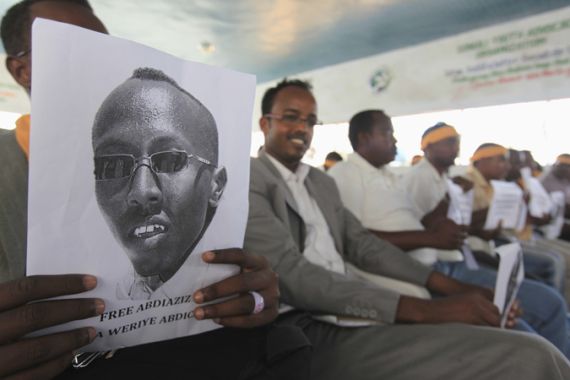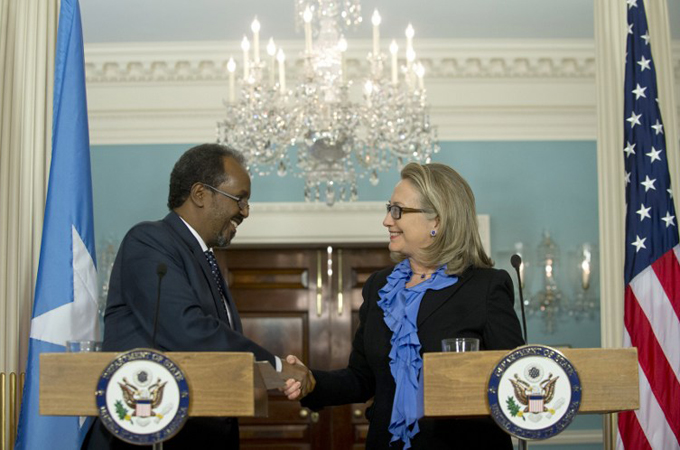Somali president: Our justice system is weak
President promises to find out why journalist controversially sentenced for interviewing alleged rape victim is in jail.

Doha, Qatar – Hassan Sheikh Mohamud, the president of Somalia, has been making his case to the international community as to why it should step up and help Somalia in its recovery from decades of civil war.
During a speech on Tuesday to academics, politicians and members of the Somali community at an event organised by the Al Jazeera Center for Studies in Doha, Qatar, Mohamud outlined the difficulties Somalia is facing and why he believes his country is ready for the world to lend its support.
Following his speech, the soft-spoken president talked with Al Jazeera’s James Welsh about why he believes the time has come for the UN Security Council to lift its arms embargo against Somalia so that it can effectively deal with its internal security issue – namely, the armed al-Shabab group.
|
“Journalists are Somali citizens. There is no special law for journalists. But I will go back to Somalia and ask why he is still jailed.“ – President Hassan Sheikh Mohamud |
He also discussed the weaknesses of his country’s government structures, the Kenyan elections, and the highly criticised jailing of a Somali journalist serving six months in prison for interviewing an alleged rape victim.
The journalist has been in detention since January 10 for interviewing the woman who claimed to have been raped by security forces. The journalist and the alleged victim were both initially sentenced to one year in prison for insulting a government body. While the women was later freed on appeal, the journalist had his sentence reduced to six months – a ruling that has been widely criticised.
Al Jazeera English: UN Secretary-General Ban Ki-moon issued a statement on Monday saying while he was grateful for the release of an alleged rape victim jailed for insulting a government body, he “regretted” that the reporter who interviewed her, Abdiaziz Abdinuur Ibrahim, remains in prison.
Human Rights Watch has called the ruling a “major setback for freedom of the media” in Somalia.
What is your response to this criticism?
Hassan Sheikh Mohamud: Journalists are Somali citizens. There is no special law for journalists. But I will go back to Somalia and ask why he is still jailed.
The issue of our justice system, we do not deny, it’s weak. As the same time, our financial systems are weak, our security systems are weak. But this is what we have.
We are declaring that we have weak institutions so criticising them will never help. What we are requesting is that the world come with us, support us, let us build effective and efficient institutions that can deliver what we are expecting them to deliver.
We are in the process of reforming, particularly the judicial system which is a priority and the process is going on.
AJE: In your speech, you highlighted the importance of women’s rights in the recovery process for Somalia. Are you concerned that the court’s handling of this case and the criticism it has received is a step backwards for Somali women’s rights?
 |
| The US has recognized the Somali government for the first time in more than 20 years, since the shooting down of two American Black Hawk helicopters [AFP] |
HSM: The woman issue for us is a national issue. This is a single case.
Women are a part of Somalia society, and that is suffering. They suffer as every Somali citizen has suffered. Of course they are vulnerable, they are weak and they are a priority for us.
We are very much committed to protect the rights of women, the rights of all vulnerable members of our society.
AJE: The UN Security Council is considering lifting the 1992 arms embargo against Somalia for one year so that the country can more effectively combat al-Shabab.
How confident are you that the embargo will be lifted?
HSM: Our colleagues in the Security Council, we don’t have any problem with them. They all agree that lifting the arms embargo, it’s the right time to do that.
But some of them may question what will happen then – how the arms will be managed in Somalia. They question the capacity of our institutions. That’s their concern and that concern is very valid.
But we are open. We are building the institutions that manage the army and we are asking their support to come, to stay with us, manage with us, so the issue is very transparent.
AJE: Amnesty International has issued a statement saying that it would be “premature” for the UN Security Council to lift the embargo.
You have stated that your institutions are weak. Do you believe they are ready for the embargo to be lifted?
HSM: Keeping the embargo in place will not solve this problem. Even after 10 years, we will remain in the same situation. We can learn only through taking responsibility.
Regarding the Amnesty International statement or any other entities, well, they can say what they say. But the reality today is, the people who say the arms embargo should not be lifted, that means Somalia should not have security forces.
Amnesty is an advocate for human rights and human rights cannot be protected without security institutions in place. Somalia has been without security institutions in place, and Somalia’s human rights have been violated in the past.
Let them come. Our doors are open. Let them participate in training our security forces to make them conscious and knowledgeable in the human rights aspect of the training.
AJE: Your neighbour, Kenya, held its general elections on Monday. With the history between the two countries, what are your thoughts on the elections, and do you believe there is anything your country can learn from them?
HSM: We appreciate the level of democracy development this country is going through.
Of course the results of these elections will affect us. And it will affect us positively if it ends with peaceful means.
If it does not, then that will be our problem. It will be a problem to all the neighbouring countries. It becomes our problem when it does not end successfully.
So far so good.
AJE: Al-Shabab had reportedly urged Muslims to boycott Kenya’s presidential election and wage jihad against the Kenyan military, which sent troops into neighbouring Somalia in late 2011 to help fight the rebels.
What effect, if any, does this have on your country’s relationship with Kenya?
HSM: Al-Shabab is not a Somalia phenomenon anymore. It is a regional phenomenon. The Kenya government has repeatedly said in the past that Al-Shabab is not Somali.
The Somali Kenyans in Kenya, they overwhelmingly participated in voting so this statement of Al-Shabab, I don’t think it has any relevance in Kenya.